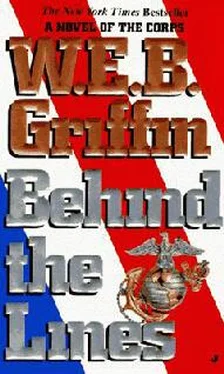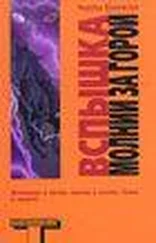W.E.B. Griffin - The Corps VII - Behind the Lines
Здесь есть возможность читать онлайн «W.E.B. Griffin - The Corps VII - Behind the Lines» весь текст электронной книги совершенно бесплатно (целиком полную версию без сокращений). В некоторых случаях можно слушать аудио, скачать через торрент в формате fb2 и присутствует краткое содержание. Жанр: prose_military, на английском языке. Описание произведения, (предисловие) а так же отзывы посетителей доступны на портале библиотеки ЛибКат.
- Название:The Corps VII - Behind the Lines
- Автор:
- Жанр:
- Год:неизвестен
- ISBN:нет данных
- Рейтинг книги:3 / 5. Голосов: 1
-
Избранное:Добавить в избранное
- Отзывы:
-
Ваша оценка:
- 60
- 1
- 2
- 3
- 4
- 5
The Corps VII - Behind the Lines: краткое содержание, описание и аннотация
Предлагаем к чтению аннотацию, описание, краткое содержание или предисловие (зависит от того, что написал сам автор книги «The Corps VII - Behind the Lines»). Если вы не нашли необходимую информацию о книге — напишите в комментариях, мы постараемся отыскать её.
The Corps VII - Behind the Lines — читать онлайн бесплатно полную книгу (весь текст) целиком
Ниже представлен текст книги, разбитый по страницам. Система сохранения места последней прочитанной страницы, позволяет с удобством читать онлайн бесплатно книгу «The Corps VII - Behind the Lines», без необходимости каждый раз заново искать на чём Вы остановились. Поставьте закладку, и сможете в любой момент перейти на страницу, на которой закончили чтение.
Интервал:
Закладка:
The labor detail appeared, and Lieutenant Lomero began to load each man with the supplies and captured weaponry to be carried off. There were more supplies than men, and the attempt to carry off the fuel proved to be a disaster. There was no way to decant the gasoline and kerosene from the drums into the vessels they had brought with them except by putting the drums on their sides and opening the filler hole. More fuel poured onto the ground than into the bottles and barrels and canteens. And the wooden barrels leaked.
Weston returned to the Buick, leaned into the backseat, and finally found the pistol he had seen in the officer's hand.
It looks something like a German Luger, he thought, as he picked it up, then dropped it in horror. It's covered with blood!
He forced himself to pick it up again, then to unfasten the officer's belt, which was also slippery with blood. A spare magazine was in a pouch on the holster. He was tempted to throw the belt and the holster away, but decided he was obliged to take it with him. When he tried to strap it around his waist, it was too small, so he looped it around his neck.
He became aware then that the Buick's engine was still running. He reached over and turned the ignition key off and then removed it. Everly came up to him. "Anytime you're ready, Mr. Weston." "Ready for what?"
"Torch the vehicles and go home," Everly said, and nodded toward the rear of the convoy. Two Filipinos were easily carrying one of the now nearly empty fifty-five-gallon gasoline drums. They stopped at the car, obviously waiting for Everly's permission to upend the drum into the car. "You search him?" Everly asked. "I got his pistol."
"I noticed," Everly said, and then spoke in Spanish to the Filipinos. They got in the car, picked up the Japanese officer's body, and slid it over the side of the car. It landed on its face. Everly carefully went through the offi-cer's pockets, coming up with a wallet, some identification papers, and a pocketknife, which he tossed to one of the Filipinos. Then he removed the officer's wristwatch.
"An Elgin," he said, tossing it to the other Filipino. "Do you suppose he bought it in Chicago, or took it away from some American?"
He waited until the Filipino, who was smiling happily, had strapped the Elgin onto his wrist, and then signaled for them to upend the gas drum into the Buick. As the dregs of the drum gurgled onto the red leather upholstery, he took out his Zippo lighter.
"Wait a minute!" he said. "Jesus Christ, how stupid can I be?"
"What?" Weston asked.
Everly shouted something in Spanish and then repeated it in English.
"Get the people with the bottles and canteens back here," he said, and one of the Filipinos said, "Yes, Sir," and ran down the road. Everly turned to Wes-ton. "These fuel tanks are full. All we have to do is cut the fuel lines, and let it run into the bottles."
"Why didn't I think of that?" Weston asked rhetorically.
"Why didn't I?" Everly said.
The translation of that, Weston thought, is, I didn't expect you to, you 're nothing but a useless fly boy I'm stuck with, but I, the professional Marine, cer-tainly should have.
It took perhaps ten minutes-which seemed to Weston far longer than that-to fill the bottles and canteens from the fuel lines of the Buick and the trucks.
Finally, Everly called, "OK. Torch them!"
He stooped beside a small but growing pool of gasoline spreading from under the Buick.
"You better step back, Mr. Weston," he said.
"Right," Weston said, and took several steps away.
Everly ignited the gasoline and then ran away, grabbing Weston's arm and dragging him into the jungle.
There was a whooshing sound. When Weston looked back, the entire rear half of the Buick was engulfed in flames.
"Sometimes it explodes worse than that," Everly said.
"I suppose," Weston said, somewhat lamely.
"That was a nice head shot you made, Mr. Weston," Everly said. "Right between the eyes. But next time, it might be better if you aimed for the chest."
I am not going to give this sonofabitch the satisfaction of correcting me.
"I knew I could hit him in the head from that distance."
"Yeah, and you did," Everly said, with a touch of what could have been reluctant admiration in his voice. "But it's sometimes better, Mr. Weston, not to take chances."
"Let's get the hell out of here, Everly."
"Aye, aye, Sir," Lieutenant Everly said.
They headed into the jungle. They had gone perhaps fifty yards when Ev-erly had the last word: There was an enormous roar as the fuel tank of one of the trucks exploded.
[ONE]
Office of the Kempeitai Commander for Mindanao
Cagayan de Oro, Misamis-Oriental Province
Mindanao, Commonwealth of the Philippines
1425 Hours 20 October 1942
All but two of the seven officers of the Mindanao Detachment of the Kempeitai were gathered in the office of Lieutenant Colonel Tange Kisho to discuss the outrage on the Bislig-Caraga highway that morning. Present were Tange; Major Ieyasu Matsudaira, his deputy; Captains Matsuo Saikaku and Tokugawa Sadanobu; and Lieutenant Ichikawa Izumo. Lieutenants Okuni Sannjuro and Iemitsu Tokugawa were at the scene of the outrage supervising a ten-man de-tail searching the area.
Lieutenant Hideyori Niigata, the signals officer, had been summoned in case he might be needed. He was waiting outside Tange's office, sitting on a wooden bench once used by citizens of the Commonwealth of the Philippines seeking audience with the Provincial Governor.
It went without saying that the outrage had to be dealt with immediately and with the greatest severity. The question was how, and with what degree of severity.
Major Ieyasu Matsudaira believed the action to be taken was self-evident. One senior Japanese officer, Major Shimabara Hara, and nineteen other ranks, had been murdered. Therefore, five Filipino males from the surrounding area should be hung in retribution for Major Shimabara's murder-a five-to-one ratio-and thirty-eight Filipinos-a two-to-one ratio-hung in retribution for the other deaths. The arrests should be made today, Major Ieyasu argued, the arrestees interrogated overnight, and the executions carried out first thing in the morning.
Captain Saikaku disagreed with Major Ieyasu, and did so with less tact than Ieyasu expected. Neither Saikaku's disagreement, nor his lack of tact, sur-prised Lieutenant Colonel Tange.
"It is the policy of the Emperor," Saikaku pontificated,"that we enlist the support of the people here by incorporating them into the Greater Asian Co-Prosperity Sphere. Hanging forty-odd innocent Filipinos is not the way to do that."
"Nineteen of His Majesty's soldiers have been murdered, including a sen-ior officer who was a dear friend," Ieyasu snapped. "That cannot go unpun-ished. Moreover, the attack itself challenges our authority here, and that cannot be tolerated."
"If we had the people who did this, I would put the rope around their necks myself. I would do so in the square here, with the people watching. But we don't have the people who did this-"
"We know who they are," Ieyasu interrupted. "This so-called 'U.S. Forces in the Philippines.' "
"No, Sir, we don't know that," Saikaku responded. "That is one possibil-ity."
"And the others?"
"Simple bandits. Mindanao has a long history of banditry."
"We found U.S. Army cartridge cases all over the site, for U.S. Army rifles and submachine guns."
"Which proves nothing. Before we liberated these islands, bandits-many of them members of the Moro tribe-frequently attacked U.S. and Filipino Army units, robbed them, and made off with their weapons. What I am saying is that the execution of forty-odd Filipinos on the questionable premise that they aided U.S. Forces in the Philippines would both unnecessarily antagonize the Filipino population and would lend credence to the idea that U.S. Forces in the Philippines is in fact a military force which threatens us. We don't want that to happen."
Читать дальшеИнтервал:
Закладка:
Похожие книги на «The Corps VII - Behind the Lines»
Представляем Вашему вниманию похожие книги на «The Corps VII - Behind the Lines» списком для выбора. Мы отобрали схожую по названию и смыслу литературу в надежде предоставить читателям больше вариантов отыскать новые, интересные, ещё непрочитанные произведения.
Обсуждение, отзывы о книге «The Corps VII - Behind the Lines» и просто собственные мнения читателей. Оставьте ваши комментарии, напишите, что Вы думаете о произведении, его смысле или главных героях. Укажите что конкретно понравилось, а что нет, и почему Вы так считаете.










